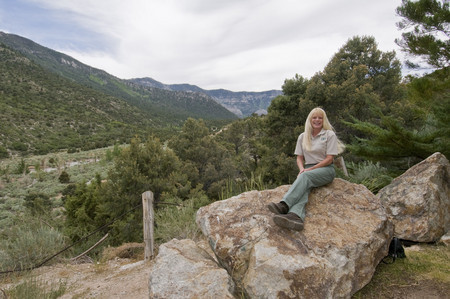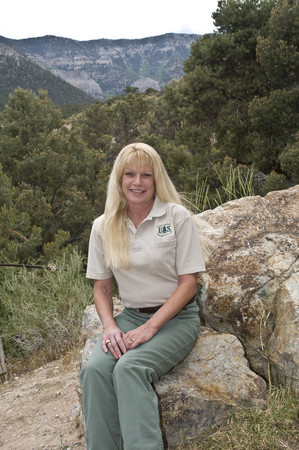Cleanup coordinator says picking up litter gets her outside, involved
Anyone who enjoys visiting Mount Charleston should thank Patty Conant and her volunteers for their work.
Anyone who visits Mount Charleston and leaves their trash behind should apologize to them.
Conant is the U.S. Forest Service's litter cleanup coordinator.
That means she walks the roads, trails and recreation areas and picks up everything from picnic remains to containers of used motor oil to decaying animals people have killed and dumped on the mountain.
It's not a glamorous job, but it gets Conant outdoors, provides lots of exercise and gives her a sense of accomplishment at the end of every shift.
"It is great exercise, there are no gym fees, you get to come enjoy this gorgeous green, you are doing something worthy, and when you are done you see the results and you feel good about that," she says of the job.
But with an estimated 1 million visitors to Mount Charleston every year, it is a job that is way too big for one person.
Conant's goal is to get 50 groups that will come to the mountain at least once a year to help out.
So far she's lined up groups from Wells Fargo and NV Energy and support from local businesses such as Las Vegas Ski and Snowboard Resort and the Resort at Mount Charleston as well as lots of people who live on the mountain.
She also picks up litter in her spare time and enlists family members to help.
The job can be dirty, exhausting and, when the litter piles up in places Conant and the volunteers have just cleaned, overwhelming.
But she learned to develop a calm, persistent approach to the never-ending stream of trash that keeps her upbeat even as she recounts some of the more thoughtless, and disturbing, detritus that has turned up on her watch.
"Oh yeah, I'm always thinking litter," she says.
Question: Before you became the litter coordinator, did you ever envision yourself picking up trash for a living?
Answer: I never thought I would do it, never thought it would appeal to me.
Question: What changed?
Answer: It is hard to describe unless you actually do it. It is kind of fun. You are hiking, you are walking, you see something, you pick it up. At first you are interested in what you are finding and what it tells you about the people who left it. And then when (my predecessor) moved away and I started doing it by myself in my personal vehicle ... then it became this obsession. I just wanted to get as much as I could and get it cleaned up. I just wanted it clean.
And now I've calmed down quite a bit. It is nice to have people come and help. You talk about the mountain and it is a socializing thing.
Question: So you've evolved on the job? What do you enjoy about it?
Answer: I'm not as obsessed, I understand it is going to be there. If I pick it up today it might be back next week. I've got a better understanding of the litter, it really is fun.
Picking up litter has gotten me more involved with the community. Nobody ever dreams of picking up litter for a living, but if you actually did it you can see it has its advantages. Just being outside and having no walls. People don't really call you up and tell you what to do.
Question: How much litter do you and the volunteers pick up?
Answer: So far this year, it is only July, we've picked up 10,815 pounds of litter. I've had almost 500 volunteers, and about 838 volunteer hours. Usually there are groups of around 20 people and each person usually picks up two bags, approximately 10 pounds per bag. About 400 pounds per group. I had a Get Outdoors Nevada group on Saturday that was a little larger, 33 people, and we picked up 62 bags of litter.
Question: Are some areas worse than others for litter?
Answer: Deer Creek picnic area is a big high-use area in the summertime. The Meadow is another high-use area. Mary Jane Falls parking area, Cathedral Rock, all of those. They are pretty much nonfee areas and people fill them up.
Question: What sorts of things do you find?
Answer: It is anything and everything you can think of. From your home, lamps, clothes, beverage containers, food containers, everything. We find containers of motor oil, stuff that if it seeps into the mountain it is not going to be good for the trees, empty cans of aerosol spray paint. We've even found some pretty gross stuff. Dead animals. Not the ones who were brought up here and buried peacefully.
Last summer they found a puppy, a kitten and a chicken, together, on a pizza box. That was intentional. I found an animal in a bag, a plastic bag. When I went to pick it up the bag opened and it was half liquid and half solid, and that stench, oh my gosh, it was so bad.
Question: Does the job ruin your faith in people?
Answer: No, it really doesn't. I don't actually see the people littering. I can't point to them and say, "You're the one who left that big mess." Sometimes when I just find a big mound of trash, like yesterday, and it was little foam plates, plastic forks, the empty bread bag, the empty ham container, two empty liters of Coke and they just left it and it blew all over the road, that makes me mad.
Question: What, if anything, can the Forest Service or local police do to catch people in the act?
Answer: We partner with Metro and they went to the Meadow. They kind of just dressed in normal clothes and hung out and waited to watch what people would do. It is a big snow play area, it was in the winter. As they saw people picnicking and getting up to leave and leaving their stuff, they would go over and give them a ticket.
Question: Is there anything short of sting operations that could reduce litter on the mountain?
Answer: I think through education, more trash cans. I don't really know the answer to make people stop littering. I don't think there is any single solution.
Contact reporter Benjamin Spillman at bspillman@reviewjournal.com or 702-477-3861.
PATTY CONANT
Occupation: Litter cleanup coordinator, U.S. Forest Service.
Quotable: “Nobody ever dreams of picking up litter for a living, but if you actually did it you can see it has its advantages.”
Family: Remarried for 19 years; four children and eight grandchildren all living in Las Vegas.
Education: High school; vocational school; master gardener; first aid and safety certified.
Work history: Cab driver, Scottsdale, Ariz.; journeyman meat wrapper; co-owner of a business; school secretary and aide; litter cleanup coordinator.
Hobbies: Spending time with friends and family; enjoying mountain life.
Favorite book: The Stephanie Plum series, Janet Evanovich.
Hometown: Morristown, N.J. and Scottsdale, Ariz.
In Las Vegas since: 1990.
Patty Conant can be reached at 468-8929 or peconant@fs.fed.us.





























